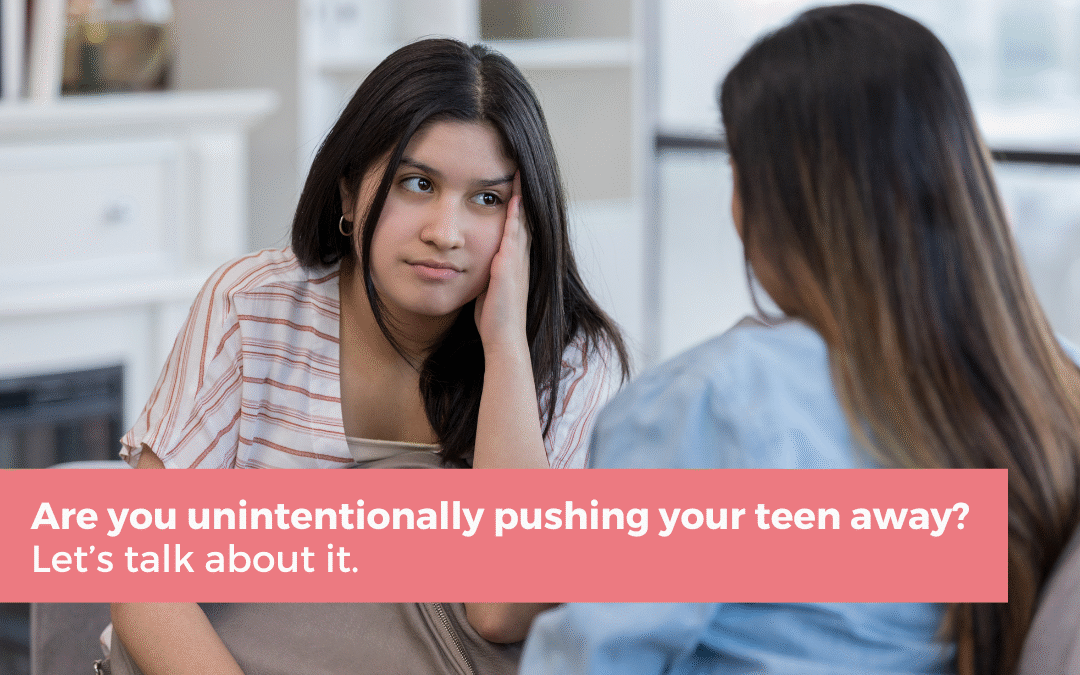Are you unintentionally pushing your teen away?
I often get asked why won’t my teen talk to me?
It’s outrageous how fast a chatty little kid can transform into a one-word-answer specialist.
If you’re stuck in the
🙎🏻♀️ “How was your day?”
👧🏼 “Fine.”
🙎🏻♀️ “Anything exciting happen?”
👧🏼 “Nope.”
loop, you’re not alone. It’s a universal struggle.
Sometimes, it’s not just about them shutting down. There might be things we as adults do (without realising it) that make teens clam up.
Let’s unpack that a little. Here are a few things that can unintentionally push teens away and what you can do instead.
Needing to be right
Your teen says something completely below the belt, and every fibre of your being is screaming to correct them. Or maybe you’re in a disagreement, and you’re convinced that you are right and they are wrong.
But when conversations become power struggles, it stops being about connection and starts being about control. Let’s be honest, no one enjoys talking to someone who always has to be right.
Try this instead: Take a breath and ask yourself, do I want to win, or do I want a relationship? Instead of debating them into silence, try saying, “That’s an interesting perspective, tell me more.”
Controlling everything
It’s easy to slip into the mindset that if they just did things my way, everything would be fine.
Maybe you don’t like the way they dress, the music they listen to, or the friends they’ve chosen. Maybe you’re micromanaging their schoolwork, their social life, or even how they spend their free time.
Here’s the problem: the more you try to control them, the more they will push back or worse, shut you out completely. You create something to rebel against.
Try this instead: Give them room to make choices (even if you don’t love those choices).
Ask, “What’s important to you about this?” instead of “Why are you doing this?” That subtle shift invites conversation instead of defensiveness.
Withholding love when they mess up
Maybe they’ve broken a rule, been rude, or done something disappointing. It’s natural to feel upset. But if the response is to withdraw or give them the silent treatment, the message that lands is your love is conditional.
And that’s a dangerous message. Teens need to know they are loved even when they mess up. Otherwise, they stop coming to you when they need support.
Try this instead: Separate the behaviour from the person. “I don’t like what you did” is very different from “I don’t like you right now.” Make it clear that the relationship is still secure, even when you’re holding them accountable.
Making it about your feelings
Teens can say things that sting. They might bring up past hurts, be dismissive, or shut you down completely. And while it’s completely understandable to feel hurt, unloading those emotions onto them can backfire.
Saying things like “After everything I’ve done for you” or “You should be grateful” shifts the focus away from their experience and onto your feelings, making them less likely to share.
Try this instead: Take a moment to sit with your feelings before responding. A simple “I hear you” or “Tell me more about that” keeps the conversation open rather than shutting it down.
Complaining about their other parent
For those in separated families (or even families where tension exists between parents), it can be tempting to vent about the other parent. Maybe it feels like they should know the truth or that they need to understand how hard things are.
But this puts them in an impossible position. No matter what the dynamic is, they still love both parents, and hearing one parent criticise the other can make them feel caught in the middle.
Try this instead: Keep the focus on their experience. If they’re frustrated with the other parent, ask, “How do you feel about that?” rather than adding your own opinions into the mix.
At the end of the day, teens don’t shut down because they don’t care. They shut down because they don’t feel safe opening up. The more they know they can come to you without fear of judgment, control, or guilt trips, the more likely they are to actually talk.
So if you’re feeling stuck, start small. Less lecturing, more listening. Less fixing, more curiosity. Less pressure, more presence.
Because connection isn’t about having all the right answers, it’s about making sure they know you’re there.








Recent Comments